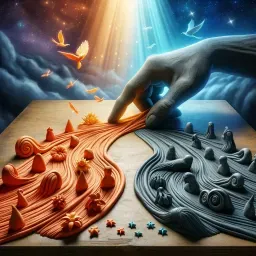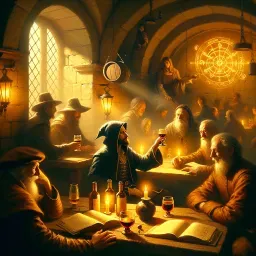”This above all: to thine own self be true,
and it must follow, as the night the day,
thou canst not then be false to any man“

0
0
0
0
- Meaning
- The phrase "This above all: to thine own self be true, and it must follow, as the night the day, thou canst not then be false to any man" from Shakespeare's "Hamlet" emphasizes the importance of authenticity and integrity. The advice is given by the character Polonius to his son Laertes. It essentially means that one should be true to their own values and beliefs, as this will lead naturally to being honest and virtuous with others. The analogy of night following day suggests that such authenticity is as inevitable and natural as the cycle of day and night.
- Allegory
- The crossroads symbolize the choices everyone faces in life about whether to be true to oneself or not. The mirror represents self-reflection and honesty. The vivid forest denotes life's vibrancy when one follows their authentic path. The day-to-night sky highlights the inevitable truth that personal honesty leads naturally to external authenticity, much like the transition from day to night. By illustrating these elements, the image conveys the essence and impact of Shakespeare’s teaching on personal integrity and truth.
- Applicability
- The advice to be true to oneself can be widely applied in personal development and interpersonal relationships. In a modern context, it encourages individuals to maintain integrity and authenticity in their actions and relationships. It advocates for personal consistency and honesty, which can build trust and respect in both professional and personal settings. Practicing this can help individuals avoid hypocrisy and live a life that aligns with their values and principles.
- Impact
- Shakespeare's phrase has lasting impact, widely cited in discussions of personal ethics and morality in literature and psychology. It is frequently used in educational contexts to promote self-reflection and in personal development seminars. It also appears in popular culture, highlighting its resonance with themes of identity and personal integrity across diverse contexts.
- Historical Context
- Written around 1600, during the early modern period of England, Shakespeare's works, including "Hamlet," were reflective of the Renaissance humanist ideas about the complexity of human nature and the value of the individual's internal world. The play embodies the psychological, philosophical, and cultural tensions of the time, such as the conflict between a medieval order and the emerging humanistic values.
- Criticisms
- While mostly celebrated, the quote has faced criticism for potentially promoting self-centeredness, interpreted by some as advocating a kind of integrity that could ignore social justice or collective wellbeing if misunderstood. However, these criticisms generally stem from differing interpretations and the balancing act between personal authenticity and social responsibility.
- Variations
- There are different cultural interpretations of being true to oneself. In collectivist societies, for example, personal truth and authenticity might be more closely aligned with group goals and communal responsibilities than the individual philosophy highlighted by Shakespeare, who laser-focused on individual integrity as understood in Western, particularly Elizabethan, contexts.
-

Alea iacta est
-

There is nothing either good or bad, but thinking makes it so.
-

We know what we are, but not what we may be.
-

Love all, trust a few, Do wrong to none: be able for thine enemy Rather in power than use; and keep thy friend Under thy own life's key: be check'd for silence, But never tax'd for speech.
-

To be, or not to be, that is the question.
-

Hell is empty and all the devils are here.
-

In vino veritas.
-

The fault, dear Brutus, is not in our stars, but in ourselves.
-

It is not in the stars to hold our destiny but in ourselves
-

The fool doth think he is wise, but the wise man knows himself to be a fool.
No Comments